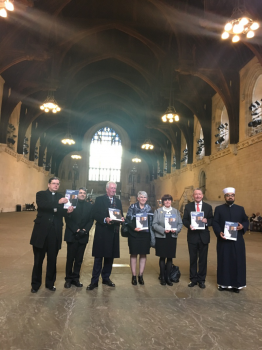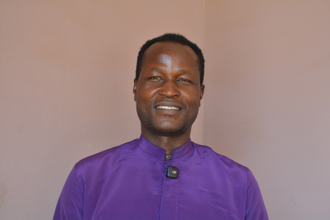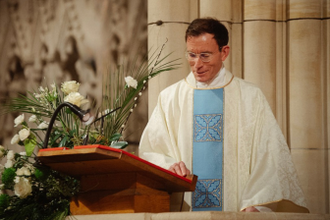Report describes global impact of religious 'hyper-extremism'

In Westminster Hall, Houses of Parliament, left - right: Fr Dominic Robinson SJ, Fr Ziad Hilal SJ, Dr Sarah Bernstein,Sister Helen Haigh, Lord Alton, Shaykh Dr Umar Al-Qadri
Religious fundamentalism - more lethal than ever seen before - is unleashing death, destruction, displacement and instability at unprecedented levels, according to a report launched in the House of Commons yesterday, attended by faith leaders and MPs. The Religious Freedom in the World 2016 report, produced by Aid to the Church in Need, warns of the global impact of "a new phenomenon of religiously-motivated violence", which it terms 'Islamist hyper-extremism'.
In defining this new ultra-extremism, the report highlights distinguishing features which are described as evidence of the radicals' threat to world peace, stability and social harmony in the West.
Key characteristics of "Islamist hyper-extremism" include systematic attempts to drive out all dissenting groups - including moderates, unprecedented levels of cruelty, global reach and the effective use of social media, often used to glamorise violence.
The day before the the launch of the report was #Red Wednesday, during which a number of events took place around the country to highlight the significance of religious freedom and to remember the thousands of people who die because of hatred against their beliefs. Many schools held prayers, a Routemaster bus carried the message: 'Stand Up For Faith and Freedom' to churches synagogues and mosques, across London. A prayer vigil was held in the piazza of Westminster Cathedral and in the evening the Houses of Parliament and dozens of faith centres were illuminated in red.
See: ICN 24 November 2016 UK marks #Red Wednesday www.indcatholicnews.com/news.php?viewStory=31407
The Religious Freedom in the World 2016 report reiterated calls for Daesh (ISIS) persecution to be recognised as genocide.
The report's authors warn of a widespread attempt to replace pluralism with a religious mono-culture.
The report, which assesses the situation regarding religious freedom in each of the world's 196 countries, concludes: "In parts of the Middle East including Iraq and Syria, this hyper-extremism is eliminating all forms of religious diversity and is threatening to do so in parts of African and the Asian Sub-Continent."
This is echoed in the report's foreword by Father Jacques Mourad, a Christian monk who was held by Daesh in Syria for five months before escaping in October 2015.
Fr Mourad writes: "Our world teeters on the brink of complete catastrophe as extremism threatens to wipe out all trace of diversity in society." The biennial report, which draws on research by journalists, academics and clergy, records that in the two-year period under review which ended in June, attacks linked to "hyper-extremism" had taken place in one out of five countries worldwide - from Australia to Sweden as well as 17 African countries.
Countering the popular view that governments are mostly to blame for persecution, the report puts the blame on non-state militants in 12 of the 23 worst-offending countries.
With refugee numbers at a new high of 65.3 million according to the UN, the report describes extremist Islamism as a 'key driver' in the massive displacement of people fleeing countries such as Afghanistan, Somalia and Syria.
The report goes on to highlight the knock-on effect on countries in the West whose socio-religious fabric is being destabilised by the arrival of unprecedented numbers of refugees. Such problems are, according to the report, compounded by the West falling victim to a sudden increase in fundamentalist Islamist attacks.
But, according to the report, not all problems regarding religious freedom are to do with militant Islam - with a 'renewed crackdown' on religious groups reported in China and Turkmenistan and an ongoing denial of human rights for people of faith in worst-offending North Korea and Eritrea. Nor is the outlook universally bleak - looking at Bhutan, Egypt and Qatar, countries notorious for religious freedom violations, the report found that the situation had improved for faith minorities during the period under review.
John Pontifex, London-based Editor-in-Chief of the report, said: "A core finding of our research is the emergence of a form of religious hyper-extremism which has left many parts of the world scarred by its savagery, which is the hallmark of its evident genocidal intent.
"Our report is a wake-up call both to highlight that extremism has entered a new and entirely more dangerous phase, and the role of the West
"If there is just one finding of the Religious Freedom in the World 2016 report it is that faith groups need to tackle hatred within their own ranks.
"What prospects are there for peace when powerful sections within specific faith groups have nothing but contempt for those who do not share their world view - and who deny the right to life not just to people of other faiths but also to moderates from among their own community?"
"The other problem borne out in the report is that Western policy makers frequently just don't get religion and need to rethink their whole outlook. It's no longer compatible to say that traditional faith practice belongs to the past when the evidence shows that for millions and millions of people - a new generation - religion is at the centre of their lives, driving everything they do."
Addressing the meeting His Holiness Patriarch Ignatius Aphrem II, head of the Syriac-Orthodox Church, who had flown in from Syria to address the meeting, described the problems facing minority communities in the country where Daesh (ISIS), Al Nusra and other extremist groups have targeted them.
"The Middle East remains [the region] where the most persecution based on religious affiliation occurs - especially against Christians...
"It continues with the systematic targeting of Christians on the Nineveh Plains in Iraq and the Khabur villages and various other villages in Syria."
He stressed that Daesh is also targeting Muslims who do not believe in the extremist's interpretation of Islamic religious texts, including Shi'a Muslims.
The Patriarch added: "We thank God that atrocities by Daesh against Christians and other minorities were recognised as acts of genocide by the United Nations and other bodies such as the British House of Commons."
Shaykh Dr Umar Al-Qadri spoke at the event about the Islamic tradition of inter-faith co-existence and condemned extremist acts carried out in the name of Islam. He said: "I get upset when I see the cartoons of the Prophet Mohammed in Charlie Hebdo - of course I do, this hurts me greatly - but I get even more upset when I see Daesh, Al-Nusra and Al-Shabab committing atrocities."
Dr Al-Qadri stressed the fact that Islamic countries for many centuries had a history of living in peace with all other faiths, and true Islamic teaching promotes peace and tolerance.
Dr Sarah Bernstein, Director-General of the Jerusalem Centre for Jewish-Christian Relations, similarly stressed the need for interfaith harmony. She said "I do not believe that God commands we kill each other in his name" - adding that inter-religious literacy and education was needed to promote tolerance in today's world. She said: "Let us move from religious violence to religious freedom, from exclusivism to inclusivism, from hatred to hope."
Sister Helen Haigh, Provincial of Europe of the Sisters of Jesus and Mary, also spoke briefly at the launch, describing the work of four sisters from her congregation who are currently providing emergency relief in Syria. One of them is Sr Annie Demajian, see: ICN 24 November 2016 - Profile: Sr Annie, working with people trapped in Aleppo www.indcatholicnews.com/news.php?viewStory=31411
This is the 13th edition of the report, which is produced by Aid to the Church in Need. The charity provides emergency aid and help for persecuted and other suffering Christians in 140 countries around the world.
Read the 'Religious Freedom in the World' 2016 report here: www.religion-freedom-report.org


















